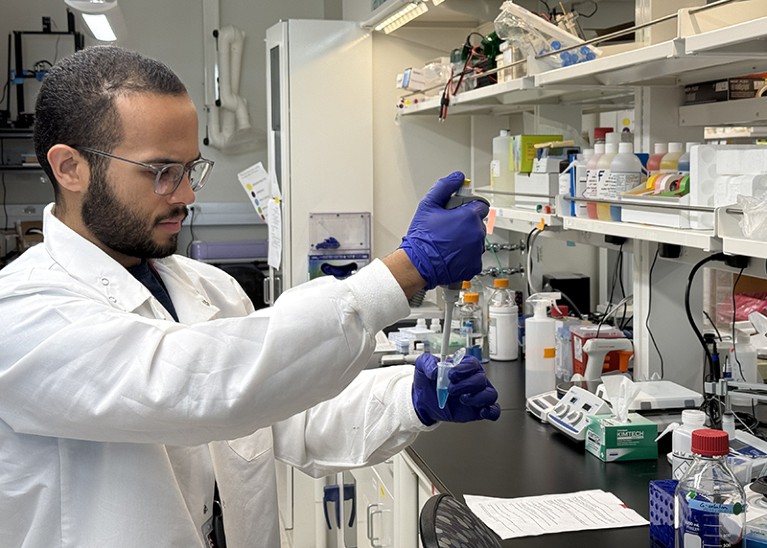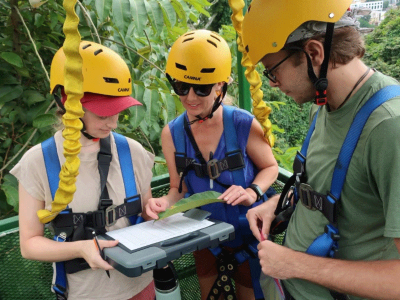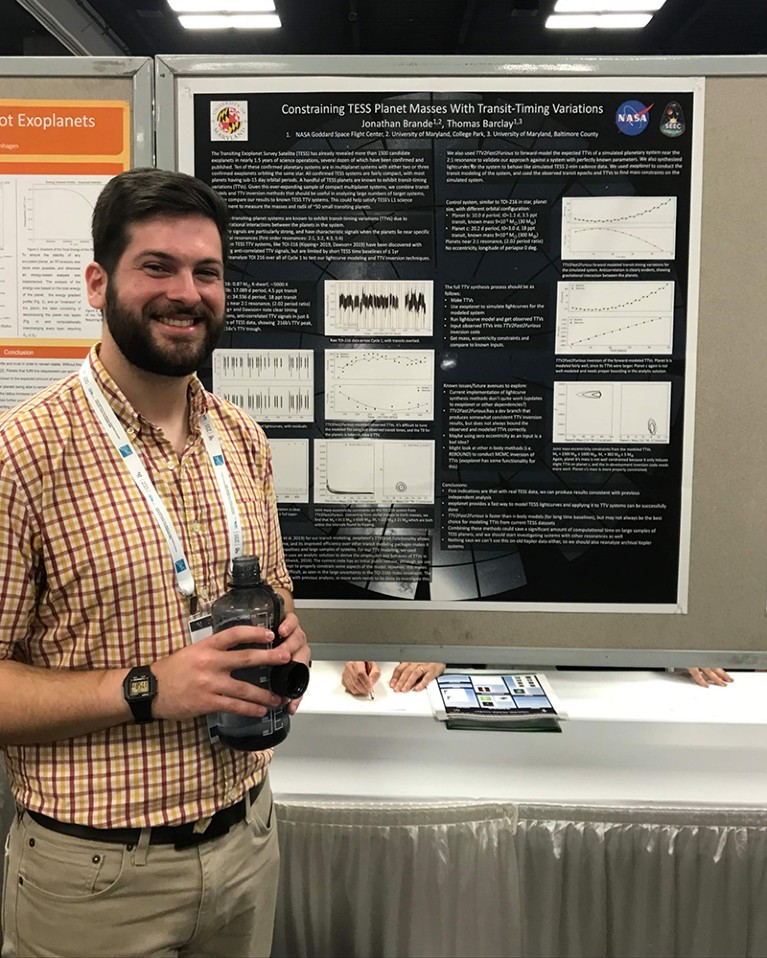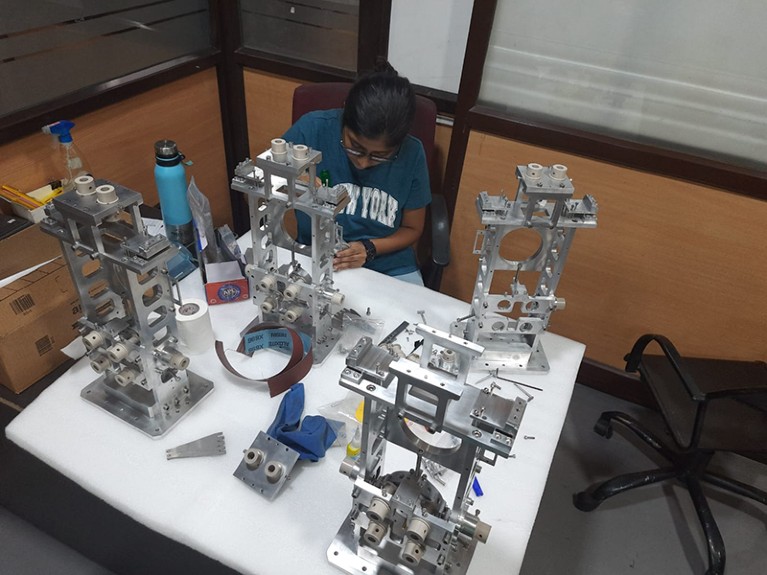
Rubén García-Reyes says his post-baccalaureate research experience helped him to work out that he wants to pursue a career in the biotechnology industry.Credit: Rubén García-Reyes
In April, Meredith MacGregor, an astronomer at Johns Hopkins University, put out a call from her laboratory in Baltimore, Maryland, on the platform X: “Annual request to please respond with any post-bac positions in astronomy you know of! Grad admissions was rough this year, and there are lots of awesome undergrads now looking for research positions to help prepare them to apply again.”
The post was a plea to connect recent university graduates with principal investigators (PIs) who could provide research experience in their labs for a year or more. These post-baccalaureate positions, or post-bacs for short, can be a stepping stone to graduate school for a master’s or PhD in science, technology, engineering and mathematics (STEM). STEM graduates who did not get enough lab- or field-based research experience at university might consider a post-bac position to make their applications to PhD programmes more competitive — even though it adds a few more rungs to an already long career ladder.
A post-bac constitutes one or more ‘gap’ years that are dedicated to gaining research experience and scientific skills before graduate school. For some people, a post-bac provides time to work out what areas of research they’re interested in. For now, post-bacs seem to be a US phenomenon.

How to run a successful internship programme
These short-term positions can boost the odds of being accepted into a graduate programme, says Roberto Zoncu, a molecular biologist at the University of California, Berkeley and co-chair of the admissions committee for biomedical-sciences graduate students at his university. Each year, Zoncu selects 35–40 PhD students from more than 900 applicants. For more than 90% of successful candidates, he says, the most important qualifier is previous research experience. It “tends to increase an applicant’s grasp of the challenges and opportunities that come with joining a PhD programme”, he says. Students with a post-bac under their belt typically show more maturity in expressing what they want to get out of a PhD programme, he adds.
But even if a post-bac leads to graduate school, it can be seen as an added burden in an already long career trajectory.
Bulking up before a PhD
For some students, however, the extra years are worthwhile. “I knew that I wasn’t ready to go directly to graduate school, but I didn’t know exactly what my options were going to be,” says Yoni Brande, who, shortly after graduating from the University of Maryland in College Park in 2017, came across a part-time research position aimed at undergraduates at the nearby NASA Goddard Space Flight Center in Greenbelt, Maryland. He got the job and then stitched together funding to make it a full-time post-bac experience.
Over two and a half years, Brande developed a keen interest in the burgeoning field of transiting exoplanets — the study of planets beyond the Solar System that are caught passing in front of their host star. The experience provided clarity on his research goals, new computational skills, practice for his academic writing and connections in the field of exoplanet astronomy. He entered the astronomy PhD programme at the University of Kansas in Lawrence in 2020.

Yoni Brande had opportunities to present his post-bac research on exoplanets at conferences, which strengthened his graduate-school applications.Credit: Jonathan Brande
For others, the added time is just that. Gwen Robbins, who completed an undergraduate degree in astronomy at Mount Holyoke College in South Hadley, Massachusetts, says: “I was planning on going straight to grad school out of college. That ended up not working.” With a CV devoid of research projects, her undergraduate adviser connected her with researchers at the Applied Physics Laboratory (APL) at Johns Hopkins. They offered her a position to assist with various projects associated with NASA’s Europa Clipper and Dragonfly missions to the moons of Jupiter and Saturn, “essentially as a paid intern” for a year, says Robbins.
Robbins acquired hands-on laboratory research experience that she could not attain from her smaller, less research-intensive university, especially during the COVID-19 pandemic. Three years on, Robbins is still seeking graduate positions, or even another post-bac.

How the pandemic is reshaping undergraduate research
Competition for astronomy graduate programmes is so harsh that “I’m entering my third year of post-bac with no job prospects, no grad-school prospects”, Robbins says. Most astronomy research positions require an advanced degree. “I’m going to be honest, I am highly considering leaving the field entirely,” she adds.
The haphazard way in which both Robbins and Brande had to chart their own post-bac course is not uncommon, especially in fields such as physics and astronomy. The American Astronomical Society’s extensive job portal does not include post-bacs as a category, although a specific search can return a small number of opportunities. MacGregor says this is why she turned to social media for help after she was approached by a few students. “I find that post-bacs are very poorly advertised and not discussed very much. And I think that’s tied to graduate admissions becoming kind of a nightmare,” she says. Her own astronomy department at Johns Hopkins received more than 400 applications for 10 PhD student slots for the 2024–25 academic year.
Seeking a solid foundation
Graduates who are trying to boost their practical research experience between university and graduate school aren’t unique to the United States. Although it is common for students in some countries, especially those in Europe, to seek a master’s degree that fulfils these goals before starting a PhD, the proportion of practical research to graduate coursework varies in these courses. And in India, students can transition from an applied-sciences bachelor’s degree to pursuing graduate study in more basic sciences. To ease that switch, they often spend a year in a ‘project student’ position — a position similar to a post-bac.
“I had never done a research project before,” says Richal Abhang, a mechanical engineer who wanted to work on the Laser Interferometer Gravitational-Wave Observatory (LIGO) research facility being built in Aundha, India. In 2019, she approached scientists at the Inter-University Centre for Astronomy and Astrophysics (IUCAA) in Pune, India, about working on the engineering aspects of the project. After a six-month unpaid internship she became a paid project student, staying on for two extra years because the COVID-19 pandemic derailed project timelines. But in the process, she learnt many practical details of designing astronomical instruments that helped her to land a spot in her top-choice graduate programme at the University of Pennsylvania in Philadelphia in 2022. “I would not have qualified for it solely based on my bachelor’s degree,” she says.
Many post-bac experiences are not formally structured or advertised. Abhang worked for six months without pay, and Brande and Robbins received stipends that were enough to cover living costs, but not benefits, such as health insurance. Some students, such as Brande and Abhang, say they had good mentors who provided clear career guidance.

Mechanical engineer Richal Abhang says she wouldn’t have landed a spot in her top-choice PhD programme without her post-bac research experience.Credit: Dr. Suresh Doravari
The field of biomedical sciences has one of the oldest continuously running post-bac programmes. The Postbaccalaureate Research Education Program (PREP), which is funded by the US National Institutes of Health, started in 2000 and is active at 58 US institutions. Between 73–95% of PREP graduates have successfully transitioned into a PhD programme in the past decade, delivering on the programme’s goal to develop a diverse pool of early-career researchers. PREP scholars receive a base salary and benefits from the NIH PREP grant, which typically amounts to around US$40,000 per year, although institutions might supplement this to make up for cost-of-living differences. Compared with a post-bac in an independent lab, PREP delivers a more structured programme with built-in opportunities for development.
“Building a science identity is really important to help post-bac trainees visualize themselves as a graduate student and as a scientist,” says Donita Robinson, a neuroscientist and the PI of the PREP programme grant at the University of North Carolina (UNC) at Chapel Hill.
Robinson outlines a typical PREP year at UNC starting in June with a boot camp in which students are taught how to interpret and discuss scientific papers, alongside meetings with faculty members to choose a lab for the next 11 months. In the lab, students take a graduate course to strengthen core concepts, improve competency or offset low undergraduate marks. “Oftentimes, poor grades have little to do with somebody’s aptitude, but rather, with life circumstances,” says Robinson. Students meet faculty mentors weekly to discuss their research progress and are encouraged to present at a biomedical-sciences conference in December or January to hone their presentation skills and give them access to networking opportunities. Around the same time, the PREP programme supports students in their graduate-school applications, such as providing them with help to prepare for the Graduate Record Examination (a standardized test required for graduate admissions in many universities in the United States), writing research statements, selecting universities and labs and sourcing recommendation letters.


